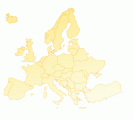Classical Conversations Cycle 2 Week 2
A little background: This is our family’s fourth year to participate in a Classical Conversations (CC) community. We participate in the Foundations portion of the program, which is designed for children ages 4 to about 11. The Foundations program lasts for 24 weeks each year. Each week the children cover 7 different grammar subjects (Timeline, History, Math, Science, English, Latin, and Geography), do a short (2-3 minutes) presentation, participate in one or more Science experiments and cover some area of Fine Arts. It’s a VERY busy morning!
This will be a really quick post about just a couple of things that I found to help with review for this week’s grammar.
Someone in a CC group somewhere (bless their hearts!) has made up a little quiz game for the European Waters. It’s nothing fancy, but both of my kids enjoyed playing some similar ones last year. It can be nice to have something different to offer, especially in Geography, and especially if you have a child who would KILL to be playing a computer game of any sort, even if it’s kind of dull. I know whereof I speak. http://www.purposegames.com/game/8310f8573c
Science Experiments
It sometimes bothers me when I feel like the Science Experiments and the Science Grammar are disconnected, so (in case it’s something that’s occurred to you) I just thought I’d point out that virtually all of our science experiments this cycle are related to either Physics or Astronomy, but we spend the first 6 weeks of the year memorizing Science Grammar that’s related to Ecology. Perhaps there just aren’t great science experiments that would work well for Ecology. So, for a few more weeks, we’ll be doing Science Experiments whose grammar we won’t really be covering until a little later (for example, Refraction is part of the Science Grammar in week 22). I don’t think it bothers the kids (at all!) like it bothers me, and actually, it creates a very good opportunity as a tutor and a parent to remind them (or “hang things on those memory pegs”) that they’ve heard the terms before, or seen them demonstrated in an experiment, which just helps it all get reinforced a little better.
Update to Science Experiments:
Mirages were one of the topics in our science experiments this week. A parent in our community let me know that there is a apparently a relatively new theory being explored that a mirage may have been the reason that the crew of the Titanic was unable to see the iceberg in time to avoid it. There is an interesting documentary on this subject that’s being shown on the Smithsonian and the Weather Channels. Here is a clip from the series:


